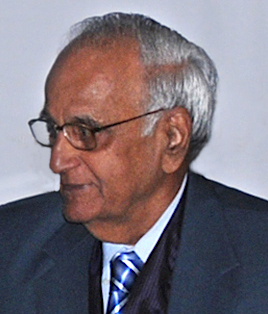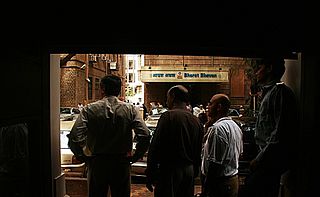Related Research Articles

The Mumbai Police is the police department of the city of Mumbai, Maharashtra. It is a part of Maharashtra Police and has the primary responsibilities of law enforcement and investigation within the limits of Mumbai. The force's motto is "Sadrakṣaṇāya Khalanigrahaṇāya".

Lashkar-e-Taiba is a militant Islamist organisation operating against India in Pakistan. The organization's stated objective is to merge the whole of Kashmir with Pakistan. It was founded by Hafiz Saeed, Abdullah Azzam and several other Islamist mujahideen with funding from Osama bin Laden during the Soviet-Afghan War.

Palaniappan Chidambaram, better known as P. Chidambaram, is an Indian politician and lawyer who currently serves as Member of Parliament, Rajya Sabha. He served as the Chairman of the Parliamentary Standing Committee on Home Affairs from 2017 to 2018.

The Intelligence Bureau (IB) is India's internal security and counter-intelligence agency under Ministry of Home Affairs. It was founded in 1887 as Central Special Branch, and is reputed to be the oldest such organization in the world.

Shivraj Vishwanath Patil is an Indian politician who was the Minister of Home Affairs of India, from 2004 to 2008 and 10th Speaker of the Lok Sabha from 1991 to 1996. He was Governor of the state of Punjab and Administrator of the Union Territory of Chandigarh from 2010 to 2015. Previously, he served in the Indira Gandhi and Rajiv Gandhi cabinets as Minister of Defence during the 1980s.

The 2006 Mumbai train bombings were a series of seven bomb blasts on 11 July. They took place over a period of 11 minutes on the Suburban Railway in Mumbai, the capital of the Indian state of Maharashtra and the nation's financial capital. The bombs were set off in pressure cookers on trains plying on the Western Line Suburban Section of the Mumbai Division of Western Railway. The blasts killed 209 people and injured over 700 more.

Ram D. Pradhan was an Indian Administrative Service officer, from the 1952 batch who served as Union Home Secretary and Governor of Arunachal Pradesh during the Rajiv Gandhi government. Pradhan played a major role in the signing of the Assam Accord and the Mizo Accord. He held Secretary-level positions at the international and national levels in the areas of commerce, defence and home. He was in service of the government of India for 36 years.
Anti-Bihari sentiment refers to discrimination against the migrant people of the of Bihar. Bihar had slower economic growth than the rest of India in the 1990s which led to Biharis migrating to other parts of India in search of opportunities. Bihari migrant workers have been subject to a growing degree of hatred by the locals of those states because of their stereotyping as criminals. Moreover, the Biharis have been victimized due to the growing anti-Hindi imposition sentiment in non-Hindi states owing to the Central government agencies excluding regional languages in many national exams and services.
The shooting of Rahul Raj Kundan Prasad Singh took place on 27 October 2008, aboard a BEST bus in Mumbai, India. Raj was killed in the shootout with the police after he held a bus with 12 passengers hostage in suburban Kurla. The Mumbai police alleged that he wanted to assassinate the MNS chief, Raj Thackeray. The incident sparked fierce criticism of the police and discussions nationwide, especially from the Bihar politicians. The incident was also seen as a rise of Bihari sub-nationalism to counter the agitation against migrants from Uttar Pradesh and Bihar by MNS.

The 2008 Mumbai attacks were a series of terrorist attacks that took place in November 2008, when 10 members of Lashkar-e-Taiba, an Islamist terrorist organisation from Pakistan, carried out 12 coordinated shooting and bombing attacks lasting four days across Mumbai. The attacks, which drew widespread global condemnation, began on Wednesday 26 November and lasted until Saturday 29 November 2008. A total of 175 people died, including nine attackers, and more than 300 were wounded.

Reactions to the 2008 Mumbai attacks were on the local, national and international levels. Political reactions in Mumbai and throughout India included a range of resignations and political changes. Other reactions included condemnation of the attacks by an Indian Muslim organisation and Naxalites. International reactions to the attacks was widespread, with many countries and international organisations condemning the attacks and expressing their condolences to the civilian victims. Media coverage highlighted the use of new media and internet social-networking tools in spreading information about the attacks, observing that internet coverage was often faster than more-traditional media sources.
Rakesh Maria is a former Indian Police Officer. He last served as the Director General of Home Guard. Before that he served as the Police Commissioner of Mumbai.

In the aftermath of the 2008 Mumbai attacks, there were multiple and far-ranging events that were observed. Besides the immediate impact on the victims and their families, the attacks caused widespread anger among the Indian public, and condemnations from countries throughout the world.
During and immediately after the 2008 Mumbai attacks the news media worldwide broadcast incorrect factual information on a scale often seen in a fog of war. Erroneous reporting on the 2008 Mumbai attacks included false information concerning the number of attackers, their nationality, their organizational affiliations, origins, and the methods of transport they had used. Theories and speculations were openly aired by various commentators that were later proved to be wrong. Many such speculations, such as the involvement in the attacks of the "Deccan Mujahideen", were widely reported by media worldwide. Various news outlets carried opinion pieces and unattributed theories about the origins of the attackers which were unfounded.
Pakistan and state-sponsored terrorism refers to the involvement of Pakistan in terrorism through the backing of various designated terrorist organizations. Pakistan has been frequently accused by various countries, including its neighbours Afghanistan, India, and Iran, as well as by the United States, the United Kingdom, Germany, and France, of involvement in a variety of terrorist activities in both its local region of South Asia and beyond. Pakistan's northwestern tribal regions along the Afghanistan–Pakistan border have been described as an effective safe haven for terrorists by Western media and the United States Secretary of Defense, while India has accused Pakistan of perpetuating the insurgency in Jammu and Kashmir by providing financial support and armaments to militant groups, as well as by sending state-trained terrorists across the Line of Control and de jure India–Pakistan border to launch attacks in Indian-administered Kashmir and India proper, respectively. According to an analysis published by the Saban Center for Middle East Policy at the Brookings Institution in 2008, Pakistan was reportedly, "with the possible exception of Iran, perhaps the world's most active sponsor of terrorist groups... aiding these groups that pose a direct threat to the United States. Pakistan's active participation has caused thousands of deaths in the region; all these years Pakistan has been supportive to several terrorist groups despite several stern warnings from the international community." Daniel Byman, a professor and senior analyst of terrorism and security at the Center For Middle East Policy, also wrote that, "Pakistan is probably 2008's most active sponsor of terrorism". In 2018, the former Prime Minister of Pakistan, Nawaz Sharif, suggested that the Pakistani government played a role in the 2008 Mumbai attacks that were carried out by Lashkar-e-Taiba, a Pakistan-based Islamist terrorist group. In July 2019, Pakistani Prime Minister Imran Khan, on an official visit to the United States, acknowledged the presence of some 30,000–40,000 armed terrorists operating on Pakistani soil. He further stated that previous administrations were hiding this truth, particularly from the United States, for the last 15 years during the War on Terror.
The 2011 Mumbai bombings, also known as 13/7, were a series of three coordinated bomb explosions at different locations in Mumbai, India, on 13 July 2011 between 18:54 and 19:06 IST. The blasts occurred at the Opera House, at Zaveri Bazaar and at Dadar West localities, leaving 26 killed and 130 injured. Indian Mujahideen is believed to have carried out the attack with the personal involvement of its co-founder Yasin Bhatkal.
Dawood Ibrahim ( is an Indian mafia gangster, drug kingpin, and a wanted terrorist from Dongri, Mumbai. He reportedly heads the Indian organised crime syndicate D-Company, which he founded in Mumbai in the 1970s. Ibrahim is wanted on charges including murder, extortion, targeted killing, drug trafficking, and terrorism.
The National Counter Terrorism Centre (NCTC) was a proposed federal anti-terror agency to be created in India, modelled on the National Counterterrorism Center of the US. The proposal arose after the 2008 Mumbai attacks a.k.a. 26/11 attacks where several intelligence and operational failures revealed the need for a federal agency with real time intelligence inputs of actionable value specifically to counter terrorist acts against India. The proposal has however met with much criticism from the Chief Ministers of various states who see this as a means of weakening India's federalism.
Sayed Zabiuddin Ansaria.k.a.Abu Hamza or Abu Jundal is an Indian Islamic militant belonging to Indian Mujahideen and Lashkar-e-Taiba. He is accused of being involved in 2008 Mumbai attacks. Zabiuddin Ansari 's name was listed in the list of "50 most wanted criminals sheltered in Pakistan" released by India on 21 May 2011. He served as the handler of the 10 LeT terrorists during 2008 Mumbai attacks.
Vappala Balachandran is an Indian national security intelligence specialist. He worked as a police officer in Maharashtra in the 1960s and early 70s, and subsequently for the Cabinet Secretariat of the Government of India, where he was appointed Special Secretary.
References
- ↑ The Times of India published the entire report on its web site. The link is mis-named in the middle of the story. Dhume, Sunil (2 December 2009). "Senior officers don't even look at intelligence reports: 26/11 panel". The Times of India . Archived from the original on 25 October 2012.
- ↑ Mumbai blasts: Govt fails to keep its word, 3 yrs on Times of India. 15 July 2011
- ↑ "Pradhan Committee finds 'total confusion' in processing alerts". Sify News. 12 January 2009.
- ↑ "Maharashtra government rejects Pradhan panel report". Sify News. 16 June 2009.
- ↑ "Pradhan Committee finds serious lapses on Gafoor's part". The Hindu. 21 December 2009.
- ↑ The text of the report, as a Microsoft Word document. R.D. Pradhan and V. Balachandran (18 April 2009). "High Level Enquiry Committee on 26/11" (Maharashtra Government vide GAD GR No: Raasua.2008/C.R.34/29-A, 30th Dec 2008). Times of India.